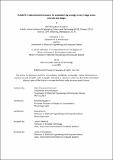PLACEIFY: A data-driven framework for evaluation-by-analogy in early-stage urban analysis and design
Author(s)
Sanatani, Rohit Priyadarshi
DownloadThesis PDF (2.747Mb)
Advisor
Nagakura, Takehiko
Davis, Randall
Terms of use
Metadata
Show full item recordAbstract
Within the field of urban design and planning, the explicit parameterization of many complex aspects of urban environments is a challenge. Specifically, the representation of ‘intangible’ experiential and affective qualities is often difficult, which makes the quantitative evaluation of such qualities problematic. Owing to these challenges, representation and evaluation though reference has long remained an essential component in design processes. Through case-studies of existing environments, designers often attempt to represent, convey and evaluate complex qualities of their own designed outcomes. However, there exist very few frameworks for systematic and data-driven referencing in contemporary urban design workflows.
Building on advances in urban information systems, big data analytics, and computer vision, this research demonstrates a data-driven framework for evaluation-by-analogy, that allows urban designers, planners and analysts to systematically reference real urban environments based on designed or envisioned urban qualities. The system generates a database of diverse urban locations across different geographical and cultural contexts around the world. A data collection pipeline is created for the extraction of selected visual, morphological, land-use and demographic features for each sample, from geolocated street-view imagery, Geographic Information System (GIS) data, landuse records and census data. For design exploration and evaluation, the system offers novel interfaces and representation structures that allow users to explore ‘similar’ samples based on envisioned urban qualities. It also allows for reference-based scenario building through explicit modification of urban parameters, as well as through other forms of reference exploration. For demonstration of the framework, a prototype web-application titled ‘PLACEIFY’ is developed. Usability-tests involving urban designers and planners indicate that such a system has strong potential to serve as a valuable decision support tool, by providing relevant data at each iteration of an imagination-modification-evaluation cycle in design.
Date issued
2023-06Department
Massachusetts Institute of Technology. Department of Electrical Engineering and Computer Science; Massachusetts Institute of Technology. Department of ArchitecturePublisher
Massachusetts Institute of Technology